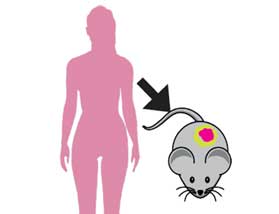
Academic and industry partners are pooling their expertise on an innovative way to study cancer – by using patient derived tumour models.
Known as patient-derived xenografts (PDX), the living biobank of cancer tissue is created by implanting tiny samples of patient tumour tissue into laboratory mice. The cancer cells continue to grow and, importantly, maintain the original tumour’s complex and diverse make up. This means they can be used as an accurate model for understanding how tumours develop, identifying new biomarkers for targeted therapy and testing potential new treatments.
The EurOPDX Consortium, a network of translational and clinical researchers working with clinically-relevant models of human cancer known as patient-derived xenografts (PDX), is teaming up with other academic and industry partners for a four-year project funded by the European Union.
The project will create a public repository holding more than 1500 established PDX models for over 30 different cancer types, and provide access to these models for the scientific community.
This newly funded project named EDIReX (EurOPDX Distributed Infrastructure for Research on patient-derived cancer Xenografts), involves 19 partners from 13 European countries and aims to further the reach of the EurOPDX Consortium by offering free-of-charge access to a large PDX resource for academic and industry researchers in Europe and Worldwide. Such a resource is currently lacking in Europe and is much-needed to increase the predictability of preclinical data through the use of more reliable cancer models.
Access to models will be offered through six state-of-the-art partner facilities in the following institutions: University of Turin (Italy), Katholieke Universiteit Leuven (Belgium), Netherlands Cancer Institute (The Netherlands), University of Cambridge (UK), Institute Curie (France), and Vall d’Hebron Institute of Oncology (Spain).
In Cambridge, Dr Alejandra Bruna in Professor Carlos Caldas’ lab in the Cancer Research UK Cambridge Institute guided the development of a framework for the generation, validation and expansion of a unique biobank of living breast cancer samples. This effort has only been possible thanks to the infrastructure and funding support from Cancer Research UK and the Breast Cancer Research Unit at Addenbrooke’s Hospital and an outstanding multidisciplinary team. The team includes research nurses, animal technicians, statisticians, researchers, pathologists, surgeons, oncologists and the wonderful breast cancer patients willing to contribute their tissue to improve the future of cancer treatment.
Recently, Bruna et al. published that a large collection of breast cancer PDXs linked to deep molecular data captures the extensive diversity of breast cancers in the clinical setting. Moreover, they pioneered the derivation of a platform for ex vivo high-throughput functional screenings with high in vivo predictive power providing a cost-effective platform in drug development and an invaluable resource of unprecedented resolution for the scientific and clinical community. The new funding will enable the wider scientific community to access this important research resource.
In order to access and compare data from different sources, the funding will be used to standardise and optimise xenografting methods, sample processing, biobanking, quality control, data processing and tracking, and the performance of in vivo drug efficacy experiments.
EDIReX has received funding from the European Union’s Horizon 2020 research and innovation programme.















